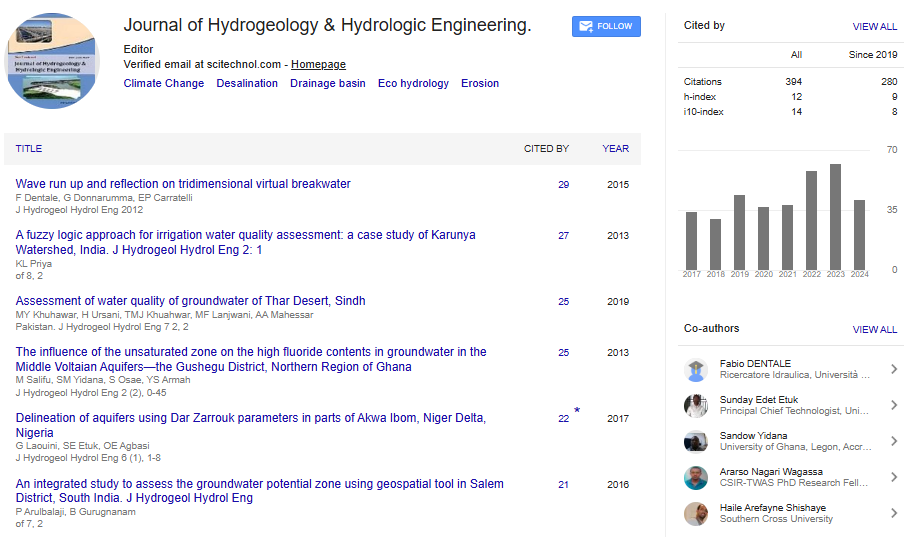Commentary, J Hydrogeol Hydrol Eng Vol: 13 Issue: 5
Ecohydrology: Integrating Ecology and Hydrology for Sustainable Water Management
Claudia Ramirez*
1Department of Hydrologic Engineering, National Autonomous University of Mexico, Mexico City, Mexico
*Corresponding Author: Claudia Ramirez,
Department of Hydrologic Engineering,
National Autonomous University of Mexico, Mexico City, Mexico
E-mail: ramirezc26@gmail.com
Received date: 23 September, 2024, Manuscript No. JHHE-24-153108;
Editor assigned date: 25 September, 2024, PreQC No. JHHE-24-153108 (PQ);
Reviewed date: 09 October, 2024, QC No. JHHE-24-153108;
Revised date: 16 October, 2024, Manuscript No. JHHE-24-153108 (R);
Published date: 24 October, 2024, DOI: 10.4172/2325-9647.100034
Citation: Ramirez C (2024) Ecohydrology: Integrating Ecology and Hydrology for Sustainable Water Management. J Hydrogeol Hydrol Eng 13:5.
Description
Ecohydrology is an interdisciplinary field that examines the interactions between water and ecosystems, aiming to create sustainable water management strategies that also support biodiversity. As water resources face increasing pressures from climate change, pollution and human activities, ecohydrology has emerged as a key approach to understanding and balancing the needs of ecosystems and human populations. By studying the natural water cycles and their effects on ecosystems, ecohydrologists develop solutions that benefit both ecological health and resource availability.
Ecohydrology combines principles from hydrology (the study of water) and ecology (the study of organisms and their environments). By integrating these fields, ecohydrologists analyze how water availability, quality and flow impact ecosystems. They also study how ecosystems, in turn, influence water cycles through processes like evaporation, transpiration and filtration. These insights help researchers understand how disruptions in water systems such as reduced rainfall or increased pollution affect flora and fauna, as well as the long-term viability of these systems.
This field focuses on both terrestrial and aquatic ecosystems, exploring how water interacts with plants, animals, soils and the atmosphere. Some core concepts in ecohydrology include water use efficiency in plants, nutrient cycles, soil moisture dynamics and the role of vegetation in moderating water flow. Ecohydrologists may also examine the impacts of land use changes, such as urbanization or deforestation, on local and regional water cycles and ecosystem health.
One of the main goals of ecohydrology is to implement ecosystembased water management practices. This approach recognizes that healthy ecosystems naturally regulate water cycles, improve water quality and reduce risks of flooding and drought. For example, wetlands serve as natural water filters, removing pollutants and excess nutrients before they reach larger water bodies. Forests help retain moisture, prevent soil erosion and moderate surface water flows. By conserving and restoring these natural systems, ecohydrologists help create sustainable water management practices that benefit both nature and society.
Ecosystem-based water management contrasts with traditional engineering-focused water management, which often involves largescale infrastructure like dams, canals and levees. While these structures are effective for controlling water flow, they can also disrupt ecosystems and lead to long-term environmental degradation. Ecohydrology promotes solutions that work with nature, such as restoring wetlands or reforesting degraded areas, to improve water management while minimizing ecological harm.
As climate change continues to alter precipitation patterns and increase the frequency of extreme weather events, ecohydrology plays an essential role in adapting water management practices. Droughts, floods and rising temperatures are placing new stresses on water resources, often with severe consequences for ecosystems. Ecohydrologists study how climate change affects water availability, seasonal flow variations and ecosystem resilience. Their research helps identify ways to adapt land use and water management strategies to buffer against these changes.
For instance, in regions facing prolonged droughts, ecohydrology can guide the planting of drought-resistant vegetation or promote water conservation techniques in agriculture. In areas at risk of flooding, ecohydrologists may recommend reforesting watersheds to reduce runoff and increase water infiltration. These strategies not only protect ecosystems but also enhance the flexibility of communities dependent on water resources.
Urban areas present unique challenges and opportunities for ecohydrology. The rapid expansion of cities often leads to the loss of natural landscapes and increased surface runoff, contributing to flooding and water pollution. Urban ecohydrology seeks to create green infrastructure solutions, such as green roofs, rain gardens and permeable pavements, that simulator natural processes and reduce the negative impacts of urbanization on water cycles.
These ecohydrological interventions improve water quality, reduce the risk of flooding and create green spaces that enhance urban biodiversity and improve residents' quality of life. As cities continue to grow, the integration of ecohydrology into urban planning can help manage water sustainably, supporting both urban ecosystems and human populations.
Conclusion
Ecohydrology offers a promising approach to sustainable water management by integrating ecological principles into hydrological practices. By studying the complex relationships between water and ecosystems, ecohydrologists develop solutions that protect biodiversity, improve water quality and reduce the risks associated with floods and droughts. In the face of climate change and rapid urbanization, ecohydrology provides valuable insights for creating resilient landscapes and communities. As more countries recognize the importance of protecting natural water systems, ecohydrology will continue to play an essential role in shaping sustainable, ecosystemfriendly water management practices.
 Spanish
Spanish  Chinese
Chinese  Russian
Russian  German
German  French
French  Japanese
Japanese  Portuguese
Portuguese  Hindi
Hindi 
